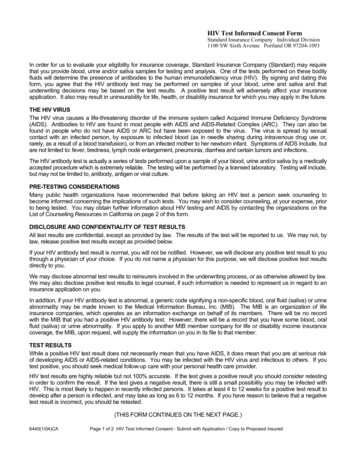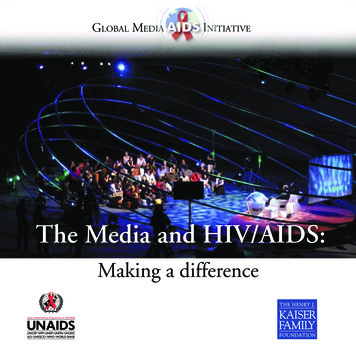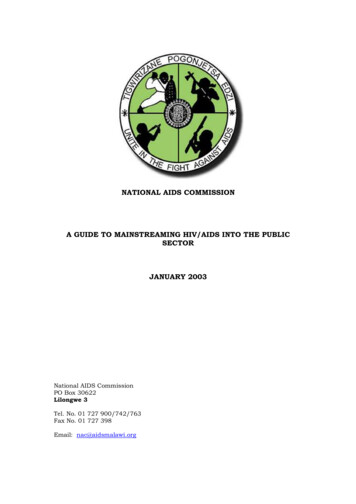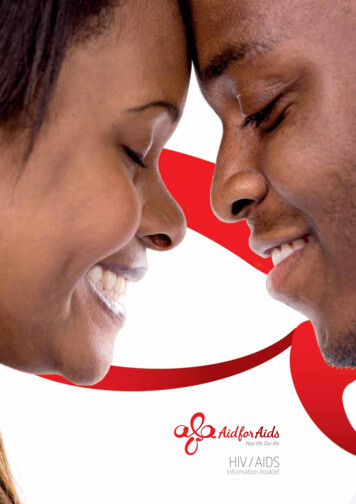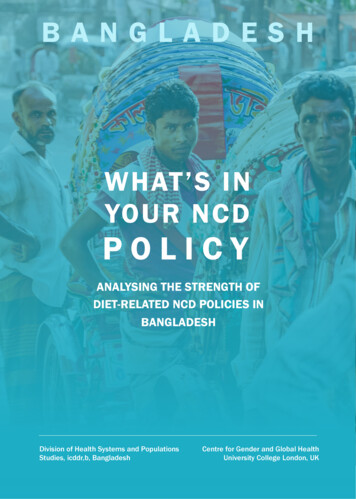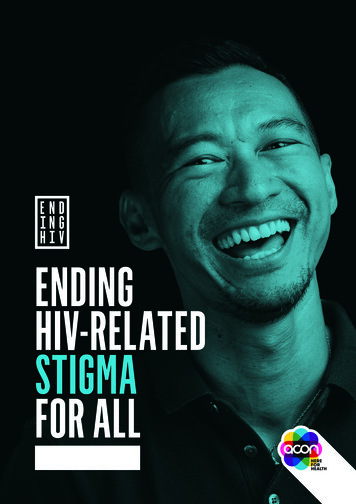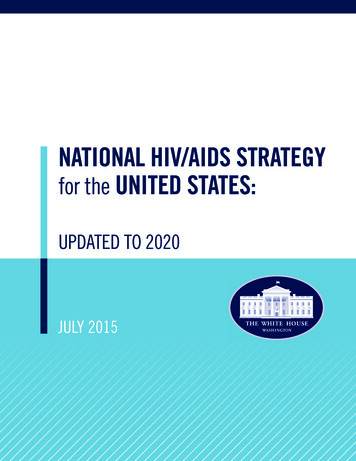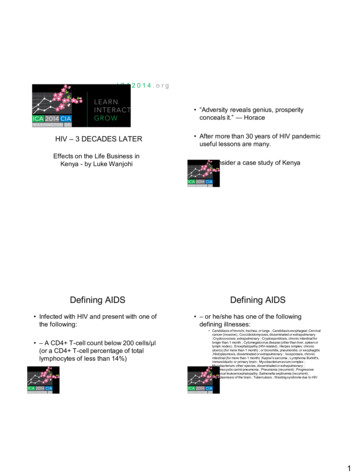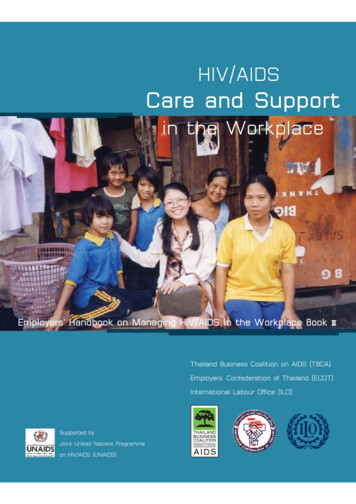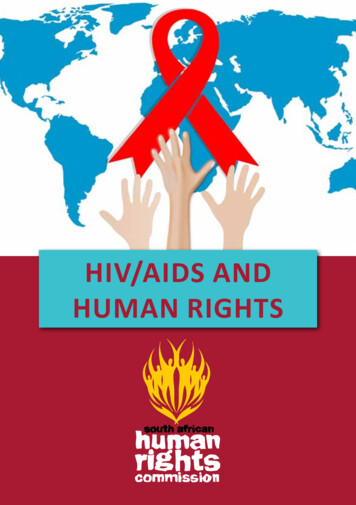
Transcription
HIV/AIDS ANDHUMAN RIGHTSHIV/AIDS AND HUMAN RIGHTS 1
BACKGROUNDThe South African Human Rights Commission (SAHRC) is an independent institutionestablished in terms of Chapter 9 of the Constitution of the Republic of SouthAfrica, (the Constitution) to support constitutional democracy. The mandate of theSAHRC is to promote, protect and monitor the observance of human rights in theRepublic. In line with its promotional mandate, the SAHRC must educate and raiseawareness to promote respect for human rights and a culture of human rights.The SAHRC has developed this pamphlet to provide the general public with basicinformation on HIV/ AIDS, which information is vital in the fight against HIV/AIDS.The information in this pamphlet is intended to highlight some of the key rights ofpersons living with or affected by HIV/AIDS to enable people to claim and asserttheir rights. This information is in addition to a number of materials availablefrom clinics and other sources which provide information to support affected andinterested people.An open and supportive rights-based approach to HIV/AIDS is essential to ensurethat everyone enjoys full access to means of prevention, voluntary counseling andtesting, long-term sustainable treatment, care and support, and can live free fromfear, violence and discrimination. Without such an approach, increasing numbersof people will be deprived of the possibility to live a secure and fulfilling life,consistent with the right to health and other human rights.WHAT IS HIV/AIDS?Human Immunodeficiency Virus (HIV) is a virus that attacksand gradually destroys the immune system which defendsthe body against infections. This virus is mainly transmittedthrough sexual intercourse, but can also be passed down frommother to child during pregnancy, child birth or breastfeedingand can also be acquired through the transfusion of infectedblood, the sharing of needles, for example, during drug use orthrough needle stick-injuries, in the course of duty as a healthcare worker.HIV/AIDS AND HUMAN RIGHTS 1
The HIV cannot be cured and remains in the bodyfor life. Although there is currently no cure forHIV, antiretroviral treatment (ARV) helps to keepthe virus under control and enables people livingwith HIV to lead a full and productive life. AcquiredImmune Deficiency Syndrome (AIDS) is a chronic,life-threatening disease caused by HIV. The firstdocumented AIDS case was recorded in 1981 andsince then, great efforts are being made globally toaddress the issue.STATUS OF HIV/AIDS IN SOUTH AFRICAStatistics South Africa’s 2017 Demographic and Health Survey estimates thatapproximately 7. 25 million people among the South African population are livingwith HIV/AIDS, and an estimated 19% of the population of adults aged 15-49 yearsare HIV positive. The UNAIDS 2017 Country Report also notes that South Africahas the largest HIV/AIDS epidemic in the world, with 15% new infections and 11%HIV/AIDS related deaths annually.15%new infectionsannually11%HIV/AIDSrelated deathsannually2 HIV/AIDS AND HUMAN RIGHTS7.25 MILLIONSouth Africans areliving with HIV/AIDS
Among the key populations most affected in South Africa are sex workers, withan HIV/AIDS prevalence of 57.7% of that population; and men who have sex withmen with an HIV/AIDS prevalence of 26.8%. The report further notes that SouthAfrica has the largest treatment program in the world, accounting for a total of20% of people on antiretroviral therapy (ART) globally. As HIV lowers the ability ofthe human body to fight off other diseases, and persons living with HIV becomevulnerable to opportunistic diseases such as tuberculosis (TB) which accounts forone in three deaths.“Among the key populations most affectedin South Africa are sex workers, with an HIV/AIDSprevalence of 57.7% of that population;and men who have sex with menwith an HIV/AIDS prevalence of 26.8%.HIV/AIDS AND HUMAN RIGHTS”The Constitution of the Republic of South Africa, 1996 is the supreme law of thecountry and it protects the rights of all people in South Africa. Chapter 2 of theConstitution contains the 27 rights that are collectively called the Bill of Rights andare inherent to all human beings. People living with HIV/AIDS and their families areentitled to full and equal enjoyment of all rights and freedoms in the Bill of Rights.The right to have access to health care services which is guaranteed in Section 27of the Constitution is but one of the basic human rights to which people living withHIV/AIDS are entitled.HIV/AIDS AND HUMAN RIGHTS 3
People living with HIV/AIDS are often excluded from full participationin many areas of their lives due to prejudice, stigma and discriminationmainly with regards to: Lack of access to information,Unequal access to treatment,Workplace discrimination andInfringement of the right to privacy and dignity.Discrimination commonly occurs against vulnerable groups in society suchas women, children, migrants and prisoners or detainees; and in the areasof accessing services such as medical aid, insurance, housing and education.Children are an especially vulnerable group who may acquire the virus throughmother to child transmission or through sexual abuse. Many orphaned childrensuffer indirectly when they are forced to become sole breadwinners and headsof households in cases where parents, guardians or caregivers have succumbedto HIV/AIDS. Prisoners and detainees are also at risk of contracting HIV/ AIDS dueto overcrowding and conditions within prison and thereforerequire priority attention. Migrants areoften excluded from accessing ARVsdue to a lack of awareness on thepart of some front line health carestaff. As migrants move from oneplace to another, the possibility oftheir treatment being interruptedis high. Interruption to chronictreatment can have adversehealth effects for those already onARV treatment as the virus is no longerin check and a person’s immunity isfurther compromised.4 HIV/AIDS AND HUMAN RIGHTS
People living with HIV/ AIDS often find that theyare treated differently from other patients and facebreaches of confidentiality, being openly shunned,or refused treatment. Some experience rejection orabandonment, being insulted or gossiped about, beingostracised from social activities within the community,school or workplace, lack of care and support and denialof medical services. Affected persons are exposed tosuch treatment on account of a number of reasons.Some of these relate to fears and myths that the diseaseis contagious, or to misconceived religious and culturalpractises.Regardless of the source of such treatment, affected persons face the compoundedeffect of their having to manage the burden of the disease and being ostracised.Such treatment is inconsistent with the values prescribed in our Constitution andviolates basic human rights such as equality, human dignity and privacy. Fear ofstigma and discrimination by society may also result in fewer people undergoingtesting, disclosing their status, practising preventative measures or accessingtreatment.A number of fundamental human rights may be limited. However, our law requiresthat for basic rights to be limited, they must be limited for a justifiable purposeand the limitation should be to the least extent possible to achieve the intendedpurpose. Our law also recognises that basic rights are dependent on, and relatedto each other. A violation to a person’s right to equality therefore almost alwaysresults in a violation to the related right to dignity; and a violation of the right toaccess adequate water and sanitation will impact on related rights such as theright health.HIV/AIDS AND HUMAN RIGHTS 5
EqualityThe right to equality and protection from unfair discrimination are protectedin terms of Section 9 of the Constitution and in our law through the Promotionof Equality and Prevention from Unfair Discrimination Act 4 of 2000. The rightto equality provides that everyone is equal before the law and has the right toequal protection and benefit of the law. No person, including the State or privatecompanies may unfairly discriminate, directly or indirectly against any person onany ground. In particular no person may be unjustifiably discriminated againstbecause of their HIV status. In the employment sphere potential employees oremployees cannot be discriminated against because they are HIV positive.In the workplace, HIV positive employees are protected from being dismissedor discriminated against on the basis of their HIV status. Prospective employerscannot request evidence of HIV negative status as a condition to an offer ofemployment and cannot insist on a disclosure of HIV status. The Employment“6 HIV/AIDS AND HUMAN RIGHTS”
Equity Act provides protections against such discrimination in the workplace. Inaddition, potential employees cannot be tested without consent. In the matterof Hoffman v SAA, the Constitutional Court ruled that a prospective employerunfairly discriminated against a job applicant living with HIV/AIDS by refusing himemployment on account of his HIV status. The court held that the employer hadinfringed on his right to equality and ordered that he be employed.DignitySection 10 of the Constitution provides thateveryone has inherent dignity and the right tohave their dignity respected and protected. Theright to dignity of people living with HIV/AIDScannot be infringed upon on the basis of theirHIV status. Violations to a person’s dignity maytake place either by action or words, or bothforms of conduct. Our courts are increasinglyrecognising that dignity is not only a basicright that must be protected, but also a valuewhich must guide our actions and interpretations of rights. The duty to respectthe dignity of other people applies to natural persons such as institutions as well.PrivacySection 10 of the Constitution provides thateveryone has the right to privacy whichincludes the right not to have the privacyof their communications infringed. No one,including an employer, health professional,family member, partner or friend of a personliving with HIV/AIDS is allowed to reveal such a person’s HIV status without his/herpermission to do so. The personal information of people, including their healthinformation is protected by the Protection of Personal Information Act, 4 of 2013.HIV/AIDS AND HUMAN RIGHTS 7
People living with HIV/AIDS require access to information to make informedchoices about their health and the best available treatment. Adequate informationis vital in ensuring the reduction of discrimination and related stigma which in turnassists with prevention. Information must be clear, scientifically valid and nonjudgmental. The Promotion of Access to Information Act 2 of 2000 provides thatinformation that is held by a public or private body should be made available tothe person either automatically or in terms of a request for information which ismade in terms of the Act. Such requests for information could include a requestfor a hospital record. However information can sometimes be restricted so whereaccess to such information is denied, a person must be provided reasons for therefusal.Health care, food, water and social securitySection 27 of the Constitution provides that everyonehas the right to have access to health care services andno one may be refused emergency medical treatment;sufficient food, water and social security including, if theyare unable to support themselves and their dependants,to appropriate social assistance.A hospital or doctor cannot force a person to take anHIV/AIDS test or refuse to treat a person living with HIV/AIDS. The right to access health services means that theservices should provide information about treatment,counselling, diet and support services. A large numberof public health facilities, civil society organisations, andfaith based organisations provide information, supportand health services specifically designed to assist personswith HIV/AIDS.8 HIV/AIDS AND HUMAN RIGHTS
Whilst there is no grant specifically earmarked for people living with HIV/AIDS, theSouth African Social Security Agency (SASSA) provides a disability grant for peoplewho have a chronic illness. SASSA applies specific criteria to determine whether aperson living with HIV/AIDS may access this type of grant. The grant is a temporaryone for persons who have had the disability for a period of 6 to 12 months. Inaddition, the assessment takes into account how long a person who has moderateto severe functional impairment would take to recover if they complied with theprescribed treatment. More information on this grant can be obtained throughthe local SASSA offices.As HIV/ AIDS affects everyone, families of persons living with HIV are encouragedto receive counseling, advice and information on any other interventions by thehealth and social welfare agencies.MECHANISMS TO UPHOLD THE RIGHTS OFPEOPLE LIVING WITH HIVGovernmentThe responsibility for the provision of health care services, including HIV/AIDSservices for all people throughout the country is allocated to the Departmentof Health in accordance with South Africa’s National Strategic Plan for HIV,Tuberculosis and Sexually Transmitted Infections (the national plan). The nationalplan is implemented at the provincial level through clinics, hospitals and mobileclinics throughout the country. The national plan aims at reducing new infections;improving treatment, care and support; reaching key and vulnerable populationssuch as sex workers, men who have sex with men, transgender people, people whouse drugs, prisoners, detainees and migrants; and addressing social and structuraldrivers of HIV/AIDS, tuberculosis and sexually transmitted infections.HIV/AIDS AND HUMAN RIGHTS 9
South Africa has adopted the international framework as advocated for byUNAIDS, which is the United Nations’ programme to guide, strengthen andsupport global efforts by a wide range of actors in addressing the HIV/ AIDSpandemic. This framework focuses on the five Cs approach, which includesconsent, confidentiality, counselling, correct testing and connection toprevention, care and treatment. To ensure that maximum protection is providedto health care users, Government must integrate HIV testing within relatedhealth services such as maternal and child services, tuberculosis and sexuallytransmitted infections and monitor the viral load of users through regular tests.In this way, people living with HIV/AIDS are able to obtain accurate diagnosis,prevent transmission and the virus remains suppressed to undetectable lowlevels through antiretroviral therapy for better health.All government health care facilities must treat everyone and offer counselling,HIV testing and ARVs free of charge. These facilities also provide informationon HIV/AIDS and other preventative measures. An HIV/AIDS helpline providesanswers to questions and operates 24 hours on a toll- free telephone number:0800 012 322Medical bodies such as the Health Professional Council of South Africa, theSouth African Nursing Council, the Office of the Health Standards Complianceand the Office of the Health Ombudsman and each hospital deal with complaintsregarding access to health care. More details on these bodies can be obtainedfrom the SAHRC information sheet on Access to Health Care, available on www.sahrc.org.zaNon-governmental organisationsSeveral non-governmental bodies promote the rights of people living with HIV/AIDS. Examples of such organisations include, but are not limited to the TreatmentAction Campaign, Doctors without Borders, Section 27, Legal Resources Centreand Black Sash. By way of example, the case of Treatment Action Campaign vMinister of Health resulted in a court order which required government to providethe ARV Nevirapine, freely to HIV positive mothers and their new- born babies tolimit the transmission of the virus from the mother to the child.10 HIV/AIDS AND HUMAN RIGHTS
Some organisations such as LoveLife South Africa, Soul City and other memberorganisations of the South African National Aids Council carry out awarenesscampaigns and work to prevent the spread of the disease. A large number ofindependent foundations and faith or community based organisations alsoprovide direct care and support to people living with HIV/AIDS and their families.Community advice offices, community health workers and law clinics at universitiesmay also assist with advice to members of the community.The South African Human Rights CommissionThe SAHRC engages directly with members of thepublic, State departments, other Chapter 9 bodies andcivil society organisations in order to raise awarenessand protect the rights of all people. Public education,outreach interventions, publication of educationalmaterial and disseminating information to enablethe affected group to assert and enforce their rights,are some of the methods the SAHRC uses to improveawareness levels of human rights.The SAHRC has the power to conduct investigations into any alleged violationof human rights. A human rights violation is an abuse or violation of any of therights found in the Constitution. Anyone either acting on their own interest, thatof someone else or that of an organisation can lodge a complaint with the SAHRC.A complaint may be lodged at any of the provincial offices of the SAHRC wherethe alleged violation of a right took place. A complaint can be lodged in person,by telephone, in writing or by completing the online complaint form and theCommission’s services are free.Where the SAHRC is unable to deal with a complaint, it can refer the complaint toan appropriate body. If after preliminary assessment, the SAHRC is of the opinionthat there is substance in any complaint, it will in so far as it is able to do so, assistthe complainant and other persons adversely affected to secure redress.HIV/AIDS AND HUMAN RIGHTS 11
The SAHRC has produced and publicised its Complaints Handling Procedures, whichdetail the procedure to be followed in conducting an investigation of any allegedviolation of human rights. Further, the SAHRC has adopted special measures andguidelines to cater for complaints specific to the violation of children’s rights,through the Child Friendly Complaints Handling Procedure. Both procedures areavailable on the SAHRC website.Equality Courts have been set up to assist members of the public to seek reliefif they are subjected to unfair discrimination, hate speech or harassment. Thesecourts are meant to make it easy for anyone to bring their cases to court and forthe issue to be resolved and finalised quickly. Court officials are trained to provideassistance to members of the public who wish to use the Equality Court. Legalrepresentatives are not always needed in the Equality Courts as the proceduresin these courts have been simplified to support access to justice. The SAHRCassists members of the public to argue matters before the Equality Court. EveryMagistrates Court is as an Equality Court, therefore one can contact the SAHRC orthe nearest Magistrates Court.The Commission for Conciliation, Mediation and Arbitration (CCMA) assistsemployers and employees with workplace related disputes, including thoserelating to violations of the right to equality in the workplace based on unfairdiscrimination. The CCMA has offices in all provinces.More details on other statutory bodies and entities thataddress specific complaints from the public regarding violationof a particular right can be obtained from the Commission’spamphlet on access to justice, which is available on www.sahrc.org.za12 HIV/AIDS AND HUMAN RIGHTS
PROVINCIAL OFFICESEastern CapeAddress: 3-33 Phillip Frame Road, Waverly Park,Phase 4B, Chiselhurst, East LondonTel: 043 722 7828/21/25 Fax: 043 722 7830Provincial ManagerMr Abongile SipondoContact: Yolokazi MvovoE-mail: ymvovo@sahrc.org.zaGauteng Office2nd Floor, Braampark Forum 3, 33 Hoofd Street,BraamfonteinTel: 011 877 3750 Fax 011 403 0668Provincial ManagerMr Buang JonesContact: Nthabiseng KwazaE-mail: nvkwaza@sahrc.org.zaFree State18 Keller Street, BloemfonteinTel: 051 447 1130 Fax: 051 447 1128Provincial ManagerMr Thabang KheswaContact: Alinah KhompeliE-mail: akhompeli@sahrc.org.zaKwaZulu-NatalFirst Floor, 136 Margaret Mncadi, DurbanTel: 031 304 7323/4/5 Fax: 031 304 7323Provincial ManagerMr Lloyd LotzContact: Kathleen BoyceE-mail:kboyce@sahrc.org.zaLimpopo29A Biccard Street, PolokwaneTel: 015 291 3500 Fax: 015 291 3505Provincial ManagerMr Victor MavhidulaContact: Mahlatse NgobeniE-mail: mngobeni@sahrc.org.zaMpumalangaFirst Floor, Allied Building, 34 Brown Street,NelspruitTel: 013 752 8292 Fax: 013 752 6890Provincial ManagerMr Eric MokonyamaContact: Carol NgwenyamaE-mail: cngwenyama@sahrc.org.zaNorthern Cape45 Mark and Scot Road, Ancorley Building,UpingtonTel: 054 332 3993/4 Fax: 054 332 7750Provincial ManagerMs Chantelle WilliamsContact: Zukiswa LouwE-mail: zlouw@sahrc.org.zaNorth West25 Heystek Street, RustenburgTel: 014 592 0694 Fax: 014 594 1069Acting Provincial ManagerMr Osmond MngomezuluContact: Poppy MochadibaneE-mail: pmochadibane@sahrc.org.zaWestern Cape7th Floor ABSA building, 132 Adderley Street, Cape TownTel: 021 426 2277 Fax: 021 426 2875Provincial ManagerContact: Shafeeqah SalieE-mail: ssalie@sahrc.org.zaHIV/AIDS AND HUMAN RIGHTS 13
How to contact the SAHRC:Forum 3, Braampark, Braamfontein, JohannesburgTel: 011 877 3600Website: www.sahrc.org.zaE-mail: info@sahrc.org.za / complaints@sahrc.org.zaTwitter: @SAHRCommissionFacebook: SA Human Rights Commission14 HIV/AIDS AND HUMAN RIGHTS
HIV, antiretroviral treatment (ARV) helps to keep the virus under control and enables people living with HIV to lead a full and productive life. Acquired Immune Deficiency Syndrome (AIDS) is a chronic, life-threatening disease caused by HIV. The first documented AIDS case was recorded in 1981 and since then, great efforts are being made globally to

